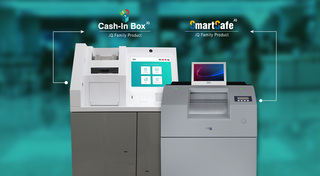Cash is the main means of payment in bank branches and retail outlets. End users are accustomed to using bank notes and coins for their daily purchases. It is calculated that the total cash volume worldwide increases by 8-10% every year.

Cash is the main means of payment in bank branches and retail outlets. End users are accustomed to using bank notes and coins for their daily purchases. It is calculated that the total cash volume worldwide increases by 8-10% every year.
This trend gives rise to certain problems for financial institutions and merchants. The issues relate to the requirements associated with cash processing, validation, and sorting. In retail up to 30% of work time of cashiers goes to various cash processing procedures. To optimize these procedures organizations use a variety of different devices, from basic banknote sorters to advanced cash recycling systems.
For these reasons, the self cash collection that is also known as Remote Cash Capture (RCC) procedure is stably growing in popularity. Using RCC, retail staff is able to deposit cash revenue onto a incorporate bank account instantly. RCC as a service is provided by financial institutions who offer a variety of devices that serve this function. The following review compares the advantages and disadvantages of different RCC device classes.
Cash Capacity
One of key requirements from the RCC devices user is the volume of safe, as it directly affects the frequency of CIT visits needed to maintain a device. The most popular automated teller safes (ATS) available on the market (such as the devices produced by Diebold Nixdorf) store 6000 to 12000 notes, though some manufacturers may offer devices with extra storage space for up to 20000 notes.
As for automated deposit machines (ADM), the market standard for their volume tends to be higher. The most popular devices used by banks store around 15000-17000 notes. However, as these devices use specialized moneybags, storage volume can be significantly increased. Yet in practice, banks do not usually consider this option due to possible issues CIT personnel may encounter when handling extra-large bags.
Device Reliability
Another key parameter is the RCC device functional reliability. In this sense, device type plays a secondary role as long as the service provider procures equipment of high quality that meets market standards.
Still, it is important to note that many ADM manufacturers construct the device in such a way that the cashiers could independently solve cash acceptor jamming issues. Moreover, some ADMs include a second cash acceptor so that ADM operation would continue when the first one become jammed or broken.
Ease of use
In terms of ease of use, both ADMs and ATSs show similar capabilities depending on the technological level of the device. Most modern devices are controlled via small touch screens where a cashier simply selects a required operation: cash count, deposit or withdrowal (for ATS). Depending on available functionality a price may jump higher.
Choosing an ADM, it is very important to understand that there may be used different types of cash validation equipment (cash acceptors). Some currency acceptors are used for deposit of separate nores, while others accept banknote bundles or work on the quasi-bundle principle, when a cashier inserts a bundle, but devices automatically takes it one-by-one. The last two device types are considered supreme, since a cashier is able to focus on a different task, while an ADM performs cash count and validation.
The choice of RCC devices requires consideration of a variety of technical parameters, such as the cash acceptance speed and rejected notes percentage. Ergonomic parameters, such as device size and weight can also be of significant importance for merchants.
Additional functionality
One important fact that puts ADMs below cash recycling system is unavailavility to withdraw cash on-demand. That is the reason, why ATSs may be a preferred option for points of sale where the amounts of deposited and withdrawn cash are approximately equal. Teller Cash Recyclers (TCR) gives cashiers the access to funds when it is needed to provide change for the customers.
Yet, traditional points of sale usually show a tendency of accumulating larger amounts of cash required for deposit. That is the main reason why ADMs initially emerged as a category of devices. The justification of cash withdrawal features is a highly individual question for each retailer.
Price and ROI
The final but not any less important is the point return of investments for RCC. Retailers who are using such services deligate responsibility for cash storage and cash gap risks to their bank. Meanwhile, financial institutions that provide RCC services benefit from a reduced need of CIT operations. In addition, cash capture equipment help manage risks associated with cash availability for the clients.
Without a doubt, ADMs provide a better payback ratio due to their price typically being 2-3 times lower than automated teller safes with similar functionality have. Thus, with the lifecycle of both devices being somewhat similar (7-9 years), ADMs offer greater return of investments.
Conclusion
Considering all the characteristics, automated deposit machines prove to be a more efficient tool of providing RCC services. That is why banks prioritize this type of equipment, trying to find the best device management software according to their needs.

Cash-in Box.iQ is a complex remote cash capture solution. Reliable deposit machines are provided with already installed ready-to-use software that is easy to integrate with the corebanking system. Cash-in Box.iQ supports all the latest authentication methods for Retail, CIT and Services staff including facial recognition technology.
Learn more about the product by contacting our company representatives.